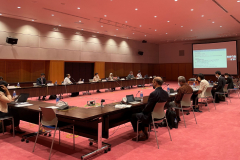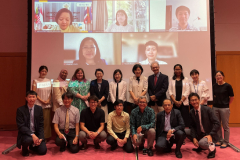Plenary Meeting Held on Research Project 'Empirical Research on Impacts of Study Abroad in Developing Countries'
2022.10.21
JICA Ogata Sadako Research Institute for Peace and Development (JICA Ogata Research Institute) held a plenary research meeting on the project “Empirical Research on Impacts of Study Abroad in Developing Countries-based on Study Abroad Experiences of Academic Professionals of Major Universities in ASEAN Countries” on Sept. 9 and 10, 2022. This meeting, held at JICA Ogata Research Institute in Tokyo, was attended by over 20 project researchers, including JICA Ogata Research Institute Senior Research Advisor Kayashima Nobuko, JICA Ogata Research Institute Visiting Fellows Sugimura Miki (professor at Sophia University), Kuroda Kazuo (professor at Waseda University), Kitamura Yuto (professor at the University of Tokyo), and Professor Umemiya Naoki of the Sophia University Global Education Center.

Participants discussed analytical approaches for data analyses
The project aims to identify the impact of study abroad on developing countries within the Association of Southeast Asian Nations (ASEAN), with focus on leading universities in Cambodia, Indonesia, Malaysia, and Vietnam. Leading universities are important for national development as they serve as centers for knowledge base formation and play an important role in fostering top-level talent. Using data collected from the faculty at these universities, the research will analyze the impact of faculty study abroad on university development. Quantitative analysis will be used to examine how university development is impacted by various factors, including country of departure, university, destination country, duration, and university expectations of faculty members, among others. Case studies will also be conducted to contextualize the role of faculty study abroad within the historical development of the universities studied.
The project was initiated in 2018 and is ongoing through collaboration between researchers in Japan and the respective target countries. Though serious difficulties were faced in gathering survey data due to the COVID-19 pandemic, data collection was completed in summer 2022 thanks to the perseverance and cooperation of the participating researchers.
In preparation for the final analysis and writing phases of the project, this plenary meeting brought together 13 researchers from the four ASEAN target countries (some of whom participated online) and nine Japan-based researchers to share the preliminary results and analyses. Further, analytical approaches to be adopted for subsequent data analyses and chapter writing were discussed. In addition to the presentation of the survey data (n = approx. 3,300), the preliminary findings from faculty interviews (n = approx. 100) regarding faculty development policies and the leveraging of study abroad experience were shared and actively discussed.

The meeting brought together researchers from the four ASEAN target countries
Three main points emerged from the discussion:
1) Faculty who received graduate-level education abroad felt that their experience had a large impact on their current roles at their university (specifically, related to education, research, social contribution, and university administration). This group reported a larger impact than that reported by faculty who did not receive graduate education abroad. The magnitude of the impact, however, differed according to the sending country, destination country, types of activities participated in, etc. For example, the impacts of study abroad were greater in sending countries in the earlier stages of higher education development. Further, the greatest impacts were observed in research, followed by education, social contribution and university administration. The manifestation of such impacts differs depending on the destination country.
2) The samples gathered from the target universities provided valuable information on trends in faculty study abroad at the master’s and doctoral level at top universities in ASEAN. For example, while study abroad to Japan is popular among faculty from Indonesia, Vietnam and Cambodia, a larger contingent of Malaysian faculty have opted for study in the UK. Further, while Japan, the Netherlands and Germany are preferred destinations for specialists in engineering, agriculture and the natural sciences, the UK, US and Australia tend to attract faculty in the social sciences. Moreover, in recent years, there has been an increase in study abroad from Cambodia to neighboring ASEAN countries. The next phase of analysis will clarify how these trends have influenced the impact of study abroad.
3) Trends in faculty acquisition of degrees abroad have changed considerably over time. For advanced ASEAN countries, domestic acquisition of master’s and doctoral degrees has rapidly increased, and graduate education has developed, enabling these countries to train faculty domestically. Further, as the internationalization of higher education advances, the importance of building international academic networks through study abroad has grown for both individual faculty and sending universities. For top universities in ASEAN, the concept of study abroad has shifted from the mere acquisition of knowledge and skills from developed countries to sustained participation in international academic networks.
These three points will guide subsequent analysis, including additional data collection and a review of the relevant literature. The results will then be compiled as part of a published volume.

事業事前評価表(地球規模課題対応国際科学技術協力(SATREPS)).国際協力機構 地球環境部 . 防災第一チーム. 1.案件名.国 名: フィリピン共和国.

事業事前評価表(地球規模課題対応国際科学技術協力(SATREPS)).国際協力機構 地球環境部 . 防災第一チーム. 1.案件名.国 名: フィリピン共和国.

事業事前評価表(地球規模課題対応国際科学技術協力(SATREPS)).国際協力機構 地球環境部 . 防災第一チーム. 1.案件名.国 名: フィリピン共和国.

事業事前評価表(地球規模課題対応国際科学技術協力(SATREPS)).国際協力機構 地球環境部 . 防災第一チーム. 1.案件名.国 名: フィリピン共和国.

事業事前評価表(地球規模課題対応国際科学技術協力(SATREPS)).国際協力機構 地球環境部 . 防災第一チーム. 1.案件名.国 名: フィリピン共和国.
scroll